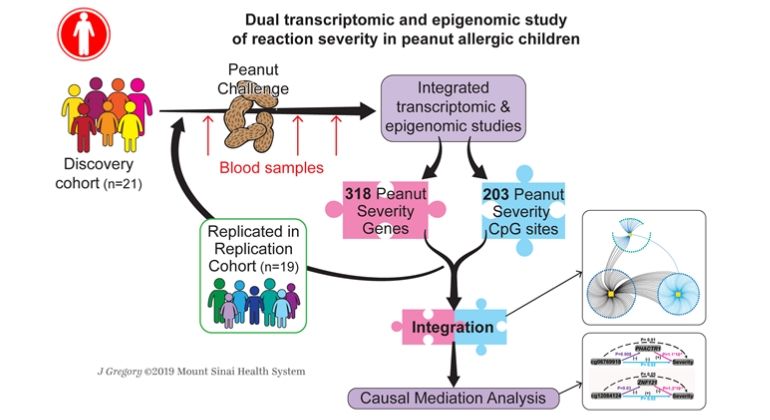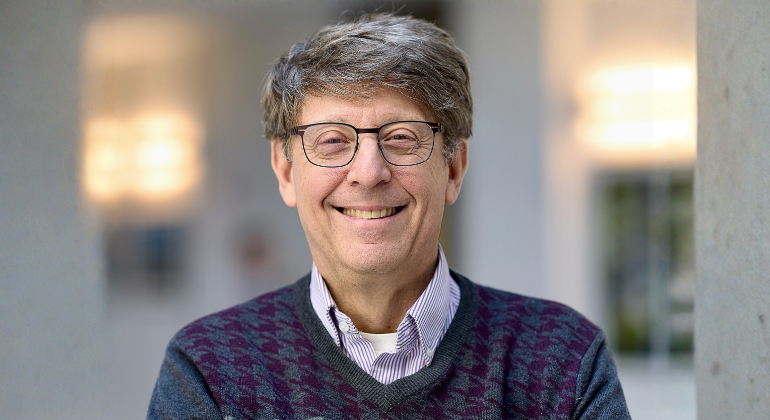Study Identifies Causes for High Rates of Allergic Reactions in Children with Food Allergies
Findings from Mount Sinai researchers also show that severe reactions are often undertreated.
A team of researchers from Mount Sinai School of Medicine and four other institutions have found that young children with documented or likely allergies to milk and/or eggs, whose families were instructed on how to avoid these and other foods, still experienced allergic reactions at a rate of almost once per year. Of severe cases, less than a third received epinephrine, a medication used to counter anaphylaxis, a life-threatening allergic condition.
The findings are from an ongoing Consortium of Food Allergy Research (CoFAR) study that has been following more than 500 children with food allergies since infancy. The results of the three-year study appear online in the June 25 issue of Pediatrics.
Nearly 72 percent of the participants experienced a reaction, with 1,171 allergic reactions in total. Allergic reactions were attributed to such factors as a lack of close supervision, misreading ingredient labels, cross-contamination, or errors in food preparation. Participating families had been given written and verbal food avoidance instruction, and written prescriptions for self-injectable epinephrine, beforehand.
"This study reinforces the importance of educating parents and other caregivers of children with food allergy about avoiding allergenic foods and using epinephrine to treat severe food-allergic reactions," said Scott Sicherer, MD, Professor of Pediatrics and Chief of the Division of Allergy and Immunology at Mount Sinai School of Medicine. "We must work harder to thoroughly educate parents about the details of avoidance and when and how to correctly use epinephrine to manage this life-threatening condition."
Approximately 11 percent of the children experienced anaphylaxis, which can include symptoms such as swelling in the throat, asthma, sudden drop in blood pressure, dizziness or fainting. The children’s parents or caregivers administered epinephrine in only 30 percent of the cases of children having severe reactions to food. Investigators found children did not receive epinephrine because either the drug was not available, or parents and caregivers were too afraid to administer the drug, or they did not recognize the reaction as severe and waited to see more symptoms.
"We found a significant number of young children received allergenic foods from caregivers other than their parents," said Hugh Sampson, MD, Dean for Translational Biomedical Sciences, Professor of Pediatrics, and Director of the Jaffe Food Allergy Institute at Mount Sinai School of Medicine. "This underscores the need to educate everyone who is responsible for the child, including grandparents, older siblings and teachers."
Dr. Sampson is the lead investigator for COFAR, which is also performing numerous food allergy treatment trials.
The study is taking place at The Mount Sinai Medical Center as well as research hospitals in Baltimore, MD; Denver, CO; Durham, NC; and Little Rock, Ark., with support from The National Institutes of Allergy and Infectious Diseases (NIAID) of the National Institutes of Health. NIAID conducts and supports research—at NIH, throughout the United States, and worldwide—to study the causes of infectious and immune-mediated diseases, and to develop better means of preventing, diagnosing and treating these illnesses.
About The Mount Sinai Medical Center
The Mount Sinai Medical Center encompasses both The Mount Sinai Hospital and Mount Sinai School of Medicine. Established in 1968, Mount Sinai School of Medicine is one of the leading medical schools in the United States. The Medical School is noted for innovation in education, biomedical research, clinical care delivery, and local and global community service. It has more than 3,400 faculty in 32 departments and 14 research institutes, and ranks among the top 20 medical schools both in National Institutes of Health (NIH) funding and by U.S. News and World Report.
The Mount Sinai Hospital, founded in 1852, is a 1,171-bed tertiary- and quaternary-care teaching facility and one of the nation's oldest, largest and most-respected voluntary hospitals. In 2011, U.S. News and World Report ranked The Mount Sinai Hospital 16th on its elite Honor Roll of the nation's top hospitals based on reputation, safety, and other patient-care factors. Of the top 20 hospitals in the United States, Mount Sinai is one of 12 integrated academic medical centers whose medical school ranks among the top 20 in NIH funding and U.S. News and World Report and whose hospital is on the U.S. News and World Report Honor Roll. Nearly 60,000 people were treated at Mount Sinai as inpatients last year, and approximately 560,000 outpatient visits took place.
For more information, visit http://www.mountsinai.org/.
Find Mount Sinai on:
Facebook: http://www.facebook.com/mountsinainyc
Twitter @mountsinainyc
YouTube: http://www.youtube.com/mountsinainy
About the Mount Sinai Health System
Mount Sinai Health System is one of the largest academic medical systems in the New York metro area, with 48,000 employees working across seven hospitals, more than 400 outpatient practices, more than 600 research and clinical labs, a school of nursing, and a leading school of medicine and graduate education. Mount Sinai advances health for all people, everywhere, by taking on the most complex health care challenges of our time—discovering and applying new scientific learning and knowledge; developing safer, more effective treatments; educating the next generation of medical leaders and innovators; and supporting local communities by delivering high-quality care to all who need it.
Through the integration of its hospitals, labs, and schools, Mount Sinai offers comprehensive health care solutions from birth through geriatrics, leveraging innovative approaches such as artificial intelligence and informatics while keeping patients’ medical and emotional needs at the center of all treatment. The Health System includes approximately 9,000 primary and specialty care physicians and 10 free-standing joint-venture centers throughout the five boroughs of New York City, Westchester, Long Island, and Florida. Hospitals within the System are consistently ranked by Newsweek’s® “The World’s Best Smart Hospitals, Best in State Hospitals, World Best Hospitals and Best Specialty Hospitals” and by U.S. News & World Report's® “Best Hospitals” and “Best Children’s Hospitals.” The Mount Sinai Hospital is on the U.S. News & World Report® “Best Hospitals” Honor Roll for 2025-2026.
For more information, visit https://www.mountsinai.org or find Mount Sinai on Facebook, Instagram, LinkedIn, X, and YouTube.
Mount Sinai Researchers Discover Treatment Option for Rare Genetic Disorder
Aug 04, 2020 View All Press Releases
Multi-omics Approach Offers New Insights into Peanut Allergy Severity
Dec 12, 2019 View All Press ReleasesIcahn School of Medicine at Mount Sinai Welcomes New Chief of Clinical Immunology
Oct 31, 2019 View All Press Releases
